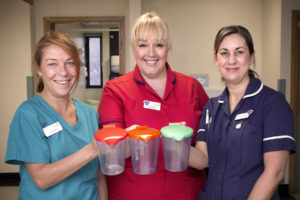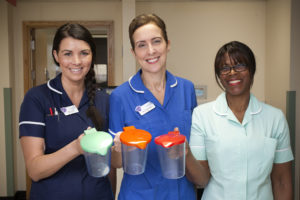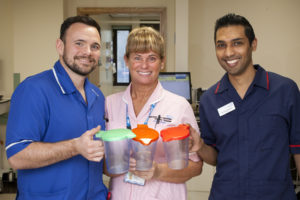
One of the biggest challenges for health professionals is ensuring that inpatients drink enough throughout their time in hospital, ultimately to aid in recovery. A lack of water can lead to dehydration — a condition which occurs when you don’t have enough water in your body to carry out normal functions. Dehydration can be the underlying cause of many common conditions which can complicate a hospital stay, including constipation, falls, infections and pressure ulcers, as well as some life-threatening conditions, such as acute kidney injury, cardiac disease and venous thromboembolism (blood clot).
In order to address this issue, from 25 November 2019 the Trust will adopt a simple, yet effective system of traffic light coloured jug lids in order to monitor the amount that individuals are drinking each and every day, as well as enabling clinicians to understand how much a patient has drunk at a glance.

Based upon a daily routine, each patient will be given a 750ml jug of water with a red lid each morning, when the patient has drunk their first jug, it will be refilled with fresh water and the lid changed to amber. When the patient has drunk their second jug, it will be once again replenished and the lid changed to green as the patient will have had 1500ml of water, reducing the risk of dehydration.
If at any point the nurses are concerned about the patient, or if by afternoon the red lid is still attached, this will be escalated to a senior colleague for further action.
Cindy Storer, Acting Deputy Director of Nursing, Midwifery and Allied Health Professionals, said: “Although such a simple concept, by visually monitoring the amount our patients are drinking we can substantially reduce dehydration within our wards. Ensuring you have enough fluids is incredibly important to recovery, and we hope to see improvements in the care we provide following the introduction of our traffic light system later this month.”
 Clinicians will also introduce a special blue lid for patients who on fluid restriction. This might be recommended by the doctors to prevent fluid building up in the body, or to reduce excess fluid that is already there.
Clinicians will also introduce a special blue lid for patients who on fluid restriction. This might be recommended by the doctors to prevent fluid building up in the body, or to reduce excess fluid that is already there.
The introduction of traffic light coloured lids forms part of the organisation’s approach to reducing dehydration amongst patients. Another element of this ongoing project is the ‘But First a Drink’ initiative, which asks all health professionals at the Trust to start and end all interactions with inpatients with the offer of a drink and a new document to record the patients fluid balance.



